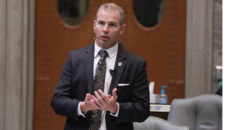JEFFERSON CITY, Mo. — As Gov. Jay Nixon and legislative leaders began crafting an incentive deal during the special session earlier this month, plenty of lawmakers wanted to use the opportunity to talk about labor issues. More specifically, a contingent of House Republicans were prepared to attach so-called “Right-to-Work” language to the deal, forcing the issue onto Nixon’s desk and potentially igniting a public debate ahead of the general session.
One lawmaker, who supported Right-to-Work, put it more bluntly. 
“This is a great opportunity to begin building a coalition next year to put something like this on the ballot,” the lawmaker says, asking not to be named. “It was a good opportunity to begin that fight.”
“That fight” would likely come in the form of a ballot initiative, so long as Nixon — who has promised to veto RTW — is Governor and Republicans lack enough vote in the House to override. Legislative hurdles haven’t stopped some, Like Rep. Eric Burlison, R-Springfield, from filing RTW legislation.
But if last week’s Boeing deal was any indication; organized labor in Missouri is not intending to go down without a fight. Even as RTW supporters last week began angling in public to paint Missouri’s non-Right-to-Work status as a major pitfall, labor moved quickly to insert themselves into an incentive deal with Boeing, and countered with an offer to highlight the benefit of an organized labor workforce in the state.
Mike Louis, Secretary Treasurer of the Missouri AFL-CIO says that he didn’t consider RTW a serious threat on the Boeing package, but that he is always concerned about a ballot initiative or legislative language aimed at “hurting labor unions.” For Louis and fellow labor members, slowing down a potential coalition on RTW during special session may have simply been an added bonus to the political capital earned during their time pushing for Boeing






